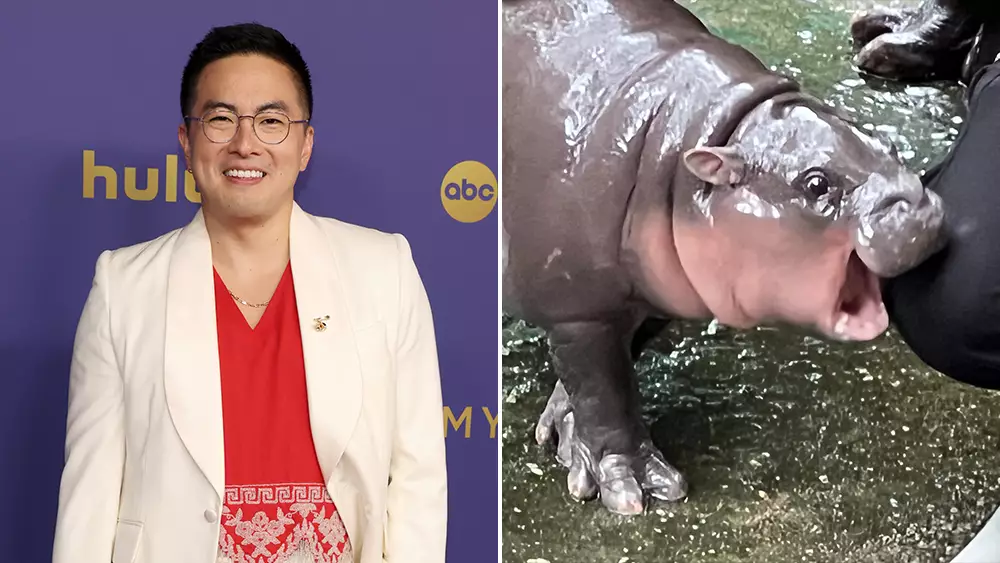In a moment that shocked and entertained audiences alike, Bowen Yang portrayed Moo Deng, a fictional pygmy hippopotamus, during the Season 50 premiere of Saturday Night Live’s “Weekend Update.” The skit sparked not only laughs but meaningful dialogue about the treatment of public figures and the intersection of fame and exploitation. By critiquing this performance and its implications, we can reflect on the societal trends surrounding celebrity culture and the responsibilities that come with it. Employing humor, Yang brought attention to various pressing topics, making us question our own involvement in the parasocial relationships we form with public figures.
The humorous take of Moo Deng was a call to action for the audience. With an offbeat charm, Yang’s adaptation of the character highlighted the often toxic dynamics between celebrities and their fans. “Women owe you nothing!” he asserted, echoing a sentiment heard throughout many discussions of consent and boundaries in modern celebrity culture. Yang’s character demanded respect and understanding, effectively shifting the narrative from a passive, comedic reference to an active dialogue about the treatment of animals and, metaphorically, women in the public sphere. This moment felt like a pressing reminder that just because someone garners public admiration doesn’t mean they owe their audience personal engagement or emotional labor.
Bowen Yang’s portrayal of Moo Deng whimsically tackled the definition of talent. “Having a slippery body that bounces,” he quipped, which is humorous but also raises deeper questions about how we define merit and success in the realm of social media and beyond. Traditionally, societal frameworks valorize conventional talent—such as music, acting, or sports—yet Yang transformed this notion and shattered norms surrounding representation. Previously, hippos in popular culture were relegated to games and cartoons, but Yang’s Moo Deng emerged as a complex character that transcends typical stereotypes and sought to broaden the narrative around diverse representations of body types and personalities in media.
In an age where political satire reigns supreme, SNL has a long-standing tradition of addressing topical issues through humor. Yang’s Moo Deng, surprisingly, wasn’t the only highlighted character on that fateful night; Devon Walker mimicked New York City Mayor Eric Adams with a tongue-in-cheek depiction that underscored the absurdities of politics today. Walker’s mockery, pointing to Adams’ failed promises and a humorous facade of busy action like “declaring war on rats,” echoed the broader dissatisfaction with political leaders’ accountability and effectiveness. Linking the humorous portrayal of Moo Deng with that of Adams serves dual purposes—the former satirically reflects on societal interaction with celebrities, while the latter draws parallels to civic disillusionment.
Through the lens of the SNL premiere, Yang and Walker’s performances unveil a significant truth about humor: it’s not merely for laughter but is also a critical tool for societal reflection. The focus on Moo Deng’s demands and Walker’s outrageous portrayal of Adams sparks conversations as audiences are prompted to consider how their interactions with public personas shape broader cultural contexts. The absurd yet relatable truth in comedy draws attention to the nuances behind fame and engagement in a world inundated with digital personas and fleeting interactions.
In capturing the essence of contemporary celebrity culture, Bowen Yang’s performance as Moo Deng becomes a compelling narrative advocating for awareness and respect. The echoes of this comedic critique resonate far beyond the studio floor—serving as an urgent reminder that our interactions with public figures must evolve alongside their narratives. As society continues to forge parasocial connections, understanding the implications of these relationships is crucial. SNL’s skit may seem like a harmless comedy, but it harbors powerful themes surrounding boundaries and the consequences of fame. Ultimately, they urge both the public and the famous to engage in a dialogue that respects individual agency in a chaotic world.
